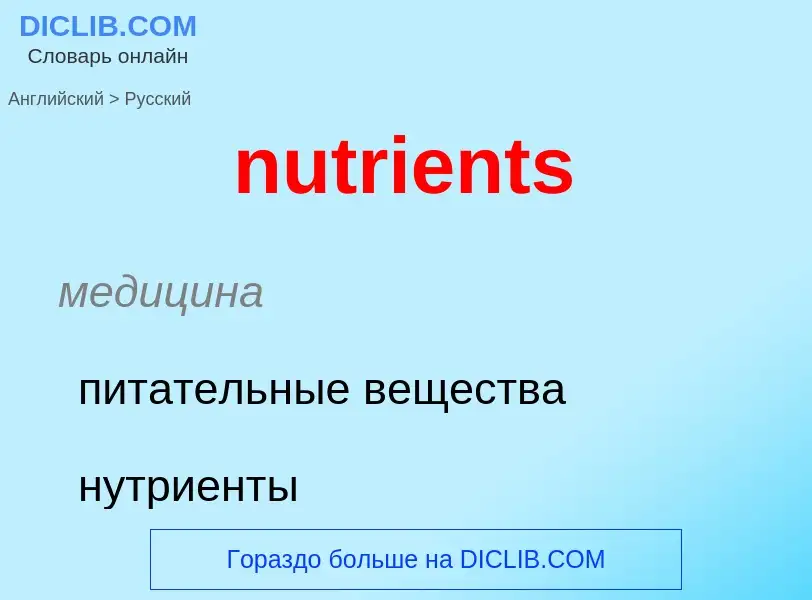Μετάφραση και ανάλυση λέξεων από την τεχνητή νοημοσύνη ChatGPT
Σε αυτήν τη σελίδα μπορείτε να λάβετε μια λεπτομερή ανάλυση μιας λέξης ή μιας φράσης, η οποία δημιουργήθηκε χρησιμοποιώντας το ChatGPT, την καλύτερη τεχνολογία τεχνητής νοημοσύνης μέχρι σήμερα:
- πώς χρησιμοποιείται η λέξη
- συχνότητα χρήσης
- χρησιμοποιείται πιο συχνά στον προφορικό ή γραπτό λόγο
- επιλογές μετάφρασης λέξεων
- παραδείγματα χρήσης (πολλές φράσεις με μετάφραση)
- ετυμολογία
nutrients - translation to ρωσικά
медицина
питательные вещества
нутриенты
['nju:triənt]
общая лексика
питательное вещество
нутриент
питательный
прилагательное
специальный термин
питательный
существительное
['nju:triənt]
специальный термин
питательное вещество
Βικιπαίδεια
A nutrient is a substance used by an organism to survive, grow, and reproduce. The requirement for dietary nutrient intake applies to animals, plants, fungi, and protists. Nutrients can be incorporated into cells for metabolic purposes or excreted by cells to create non-cellular structures, such as hair, scales, feathers, or exoskeletons. Some nutrients can be metabolically converted to smaller molecules in the process of releasing energy, such as for carbohydrates, lipids, proteins, and fermentation products (ethanol or vinegar), leading to end-products of water and carbon dioxide. All organisms require water. Essential nutrients for animals are the energy sources, some of the amino acids that are combined to create proteins, a subset of fatty acids, vitamins and certain minerals. Plants require more diverse minerals absorbed through roots, plus carbon dioxide and oxygen absorbed through leaves. Fungi live on dead or living organic matter and meet nutrient needs from their host.
Different types of organisms have different essential nutrients. Ascorbic acid (vitamin C) is essential, meaning it must be consumed in sufficient amounts, to humans and some other animal species, but some animals and plants are able to synthesize it. Nutrients may be organic or inorganic: organic compounds include most compounds containing carbon, while all other chemicals are inorganic. Inorganic nutrients include nutrients such as iron, selenium, and zinc, while organic nutrients include, among many others, energy-providing compounds and vitamins.
A classification used primarily to describe nutrient needs of animals divides nutrients into macronutrients and micronutrients. Consumed in relatively large amounts (grams or ounces), macronutrients (carbohydrates, fats, proteins, water) are primarily used to generate energy or to incorporate into tissues for growth and repair. Micronutrients are needed in smaller amounts (milligrams or micrograms); they have subtle biochemical and physiological roles in cellular processes, like vascular functions or nerve conduction. Inadequate amounts of essential nutrients, or diseases that interfere with absorption, result in a deficiency state that compromises growth, survival and reproduction. Consumer advisories for dietary nutrient intakes, such as the United States Dietary Reference Intake, are based on deficiency outcomes and provide macronutrient and micronutrient guides for both lower and upper limits of intake. In many countries, macronutrients and micronutrients in significant content are required by regulations to be displayed on food product labels. Nutrients in larger quantities than the body needs may have harmful effects. Edible plants also contain thousands of compounds generally called phytochemicals which have unknown effects on disease or health, including a diverse class with non-nutrient status called polyphenols, which remain poorly understood as of 2017.

